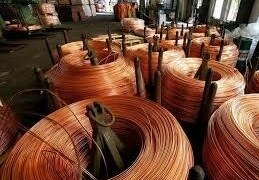 © Reuters. Water flows out as a steel slab is cooled at the Novolipetsk Steel PAO steel mill in Farrell
© Reuters. Water flows out as a steel slab is cooled at the Novolipetsk Steel PAO steel mill in FarrellBy Jonathan Cable
LONDON (Reuters) – The global economy is booming, but with growing political uncertainty and the threat of trade skirmishes after the United States imposed tariffs on steel and aluminum imports, a slowdown may not be far away.
Global growth will be at its strongest in seven years in 2018, the Organisation for Economic Cooperation and Development said on Tuesday as it raised its forecast to 3.9 percent. A January Reuters poll pegged it at 3.7 percent.
“The global boom has picked up pace and economies seem like a pack of speed skaters, chasing each other to go faster,” wrote Paul Mortimer-Lee, chief market economist at BNP Paribas (PA:), in a client note.
While the acceleration is being led by the United States, dozens of other countries are also enjoying racing growth rates.
“In our forecasting process, the key question was not whether or not this year will be good – because it is likely to be very good – but when the global economy will slow down and under what circumstances,” Mortimer-Lee wrote.
Trade friction and concerns over Britain’s exit from the European Union among other factors could all take their toll.
U.S. President Donald Trump announced plans earlier this month to slap tariffs on steel imports and aluminum products, saying trade wars were easy to win.
The International Monetary Fund’s managing director Christine Lagarde and many others disagree.
“In a so-called trade war … nobody wins. One generally finds losers on both sides,” she said.
Nearly 90 percent of 71 respondents in a recent Reuters poll said they were concerned the tariffs would lead to a wider trade war and were united in saying it would do more harm than good to the U.S. economy.
World Trade Organization Director General Roberto Azevedo expressed concern at the plans, in an extremely rare intervention over a WTO member’s trade policy.
Trump has also taken a swipe at China and asked Beijing to develop a plan to reduce its trade surplus with the United States.
Global growth could also be curtailed by political uncertainties – particularly in Europe, where an expansion in the euro zone has probably already peaked.
Britain is trying, with some difficulty, to negotiate its exit from the European Union, while Italy’s parliament is in gridlock following an inconclusive March 4 election and is facing the prospect of two radical groups running the country.
“Geopolitical risks and trade conflict risks between the U.S. and China are a concern, as is the possibility of a hard Brexit,” according to Mortimer-Lee.
A Reuters poll earlier this month gave a not insubstantial 20 percent probability of a disorderly Brexit, where no deal is reached by the end of March 2019 when divorce talks are due to be finalised.
Although there is still little clarity on the outcome – with only just over a year to go – nearly every respondent in a Reuters poll said the most likely result from talks between London and Brussels would be a free trade agreement.
The European Council meets in Brussels during the week and will review the state of negotiations with Britain at the end of the summit.
“With negotiators scrambling to get a transition period agreed in principle ahead of the EU leader’s meeting at the end of the week, there are signs that a deal may be in sight,” ING economists told clients in a note.
There have been some encouraging signals a breakthrough will be made at the meeting, and although the Bank of England will hold UK borrowing costs steady at 0.5 percent on Thursday, it is widely expected to increase them in May, a Reuters poll found.
If there is little progress then those expectations for action from the Monetary Policy Committee might be tempered.
“Given that the MPC’s forecasts are based upon a ‘smooth’ transition to any new relationship, a stalling in the negotiations until June’s European Council meeting might, at the margin, cause the MPC to delay the next hike,” said Paul Hollingsworth, senior UK economist at Capital Economics.
What is certain is that the U.S. Federal Reserve will raise interest rates on Wednesday, according to all 104 economists polled by Reuters. It is then expected to follow up with three more hikes this year.
Central banks in Colombia, Indonesia, Philippines, Taiwan and New Zealand also meet in the coming week, but none are expected to change tack. Below-target inflation is likely to push central banks in Russia and Brazil to loosen policy.
Source: Investing.com



























